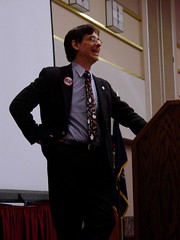Before the NWP Annual meeting, I had three separate conversations (one by email, one by phone, and one in person) with colleagues from the local, state, and national level about why and how to use digital reading and writing in their classrooms and for professional development. I had many more of these conversations at the NWP Annual Meeting and the ACE Workshop. What I will try to capture here is a basic outline of my response to them, and why I feel that these are critical literacy skills.
I hope to return to this post and update it, both because it is very rough right now and it will always be able to grow. Please feel free to help me out if you have ideas I should add, OK?
Frameworks
First, to conceptually frame digital reading and writing, there are a few places to begin:
- “Digital Immigrants and Digital Natives” is an interesting one, although not my favorite. I think that we have to look past the simple dichotomy that Prensky proposes and discuss what it means to be a critical digital citizen, native or immigrant. It is a good place to start the discussion, however, and to get teachers thinking about the differences between the ways that they approach technology and how students do it. You could also look at Tapscott’s site: Growing Up Digital
- Janet and some other English Ed folks just published an article about how to prepare English teachers and the technologies that they will encounter. Another classic from CITE is Pope and Golub’s piece.
- Why Teach Digital Writing is a great resource that practices what it preaches in terms of integrating hyperlinks and multimedia.
- Also a good one, Toward a Theory of New Literacies Emerging From the Internet and Other Information and Communication Technologies
- You could also look at NCTE’s resource page on Multimodal resources. There are many interesting things there to take a look at.
- Or, look at IRA’s position statement on literacy and technology.
- The new site from the MacArthur Foundation, “Building the Field of Digital Media and Learning” looks to be a good resource.
- The Pew Internet and American Life Project always has interesting and new stats.
- Looking at the MI state tech standards and the many literacies embedded within them.
- And, perhaps my favorite, the New London Group’s Pedagogy of Multiliteracies.
Teaching tips and things to do
- To start for tips, I would suggest that you look at Paul and friend’s “Things to do with Google Docs” doc.
- Here is Wes Fryer’s summary of one site that outlines many ideas for how to use podcasting: KidsCast: Exciting Podcasting Activities to Promote Research and Learning.
- Also, here is a site where some 3rd/4th graders used to be podcasting Room 208. Interesting to note that when Bob Sprankle moved on to another job, the podcast seems to have faded out, although he still does Bit by Bit.
- Paul’s Pedagogy of Podcasting and Be a Blogger Matrix.
- Agenda for our summer workshop on new internet writing toolsl.
- Our collaborative writing session agenda.
- The RCWP wiki, where we seem to gather some of this stuff.
I know that this is not the most organized or coherent list of stuff. Also, I am thinking of turning it into a page on this site so it remains static. But, for now, I think that it is the beginning of something worth capturing and beginning to build as a more comprehensive resource about how and why we want to teach with these technologies.


